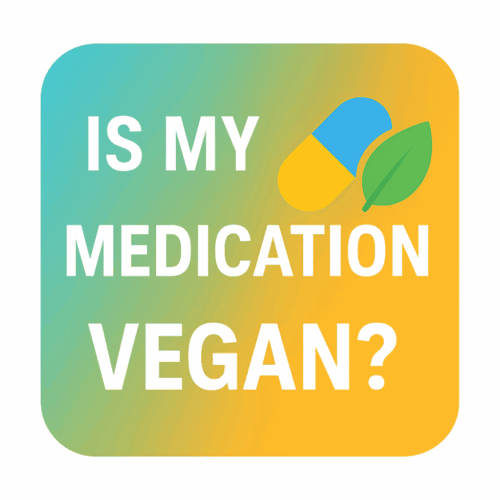Are My Medications Vegan?
A Guide for Vegans and Ingredient-Conscious Patients
Introduction
Even though the active drug in a medication is often synthetic, the inactive ingredients (known as excipients) can come from animal sources. These include common substances such as gelatin, lactose, and magnesium stearate.
Most pharmacy labels and package inserts don’t reveal whether excipients are animal- or plant-based, and manufacturers aren’t required to disclose this information. To make matters worse, ingredient sourcing can vary between batches or suppliers.
This guide is designed to help you, as a vegan or ingredient-conscious patient, understand which ingredients are commonly animal-derived and how to look up the contents of your specific medications so you can make informed, compassionate choices.
Also, you can use our free Vegan Medication Checker Tool to quickly see if your specific prescription medicine contains animal-derived ingredients like gelatin or lactose.
What’s Inside a Pill
- Active ingredients: The drug itself that treats a condition (e.g., ibuprofen).
- Inactive ingredients (excipients): Substances that help form, stabilize, or deliver the drug effectively.
Although the active ingredient may be synthetic, the excipients can be from animal sources.
Why Excipients Exist
- Improve how a medicine dissolves and absorbs
- Hold tablets together or give them shape
- Prevent spoilage and extend shelf life
- Make swallowing easier or improve taste
Examples include:
- Fillers or diluents: e.g., lactose
- Binders and coatings: e.g., gelatin or cellulose
- Lubricants or emulsifiers: e.g., magnesium stearate
- Stabilizers: e.g., glycerin
Common Animal-Derived Ingredients
Gelatin – Capsules and Vaccines
Gelatin is a protein made by hydrolyzing animal bones or skin, usually from cows or pigs. It’s used in capsule shells, tablets, and certain vaccines. A review found gelatin in 20 of the 100 most commonly prescribed medicines in primary care.
Vegan alternative: Capsules made from hydroxypropyl methylcellulose (HPMC) or “vegetable cellulose.”
Lactose – Common Filler
Lactose, derived from cow’s milk, acts as a filler, stabilizer, or carrier in tablets, capsules, inhalers, and some injections. It appeared in 59 of the 100 most prescribed drugs in one study.
Possible alternative: Formulations using sucrose or plant-based starches instead of lactose.
Magnesium Stearate & Stearic Acid – Lubricants and Preservatives
These fatty substances are often used to prevent tablets from sticking to machinery. They can come from either animal tallow or vegetable oils, but labels rarely specify which. Magnesium stearate was found in 49 of the 100 most prescribed medications.
Tip: Some manufacturers confirm plant-based sources upon request.
Glycerin (Glycerol)
A versatile ingredient used as a stabilizer or solvent. It can come from either animal fats or plant oils such as coconut or soy. Manufacturers rarely indicate the source unless the product is labeled “vegetable glycerin.”
Lanolin-Derived Vitamin D3 (Cholecalciferol)
Lanolin is a fat extracted from sheep’s wool. Most Vitamin D3 supplements are lanolin-derived and therefore not vegan. Plant-based D3 from lichen and D2 from yeast are vegan alternatives. Lanolin is also found in some topical creams and lip products.
How to Research What’s in Your Medication
- Check the package insert.
Look for a section titled Inactive Ingredients or Other Ingredients. - Search DailyMed.gov.
This U.S. National Library of Medicine database lists official package inserts for all FDA-approved medications, including inactive ingredients. - Use Drugs.com or MedlinePlus.
Both provide ingredient information and manufacturer links. The SPC or PIL is often linked from the manufacturer’s site. - Contact the manufacturer.
To confirm the source of specific ingredients, reach out directly. Contact information can usually be found at the bottom of the SPC or on the manufacturer’s “Medical Information” page. - Check independent vegan medication databases.
Resources like VeganMed offer searchable databases to help identify animal-free medications.
Tip: Pharmacies can sometimes order vegan-friendly versions of common medications — just ask your pharmacist.
Making Ethical Medical Decisions
When Alternatives Exist
If a medicine contains animal ingredients, ask your healthcare provider about alternatives. Options may include:
- A different brand, strength, or formulation (e.g., liquid or tablet instead of capsule)
- A medication in the same drug class but made with plant-based excipients
- A different route of administration (e.g., patch or injection instead of tablet)
Vegetarian capsules made from HPMC are now widely available and can sometimes replace gelatin forms.
Talking with Your Doctor or Pharmacist
Be open about your dietary or ethical preferences. Healthcare professionals are encouraged to respect patient beliefs and can help find suitable alternatives.
A simple discussion might include:
“I avoid animal-derived products whenever possible. Could we review my medications to see if there are vegan or plant-based options?”
Open communication helps improve understanding, adherence, and comfort — even when a non-vegan medication is temporarily unavoidable.
When Ethical Compromise Is Medically Necessary
Veganism, as defined by The Vegan Society, seeks to avoid animal use “as far as is possible and practicable.”
In urgent or life-saving situations, health takes priority. Most ethical leaders agree that it’s acceptable to take non-vegan medications when no alternative exists.
“Taking a non-vegan medication when no alternative exists doesn’t make you less vegan — it makes you human.”
The Vegan Society also emphasizes:
“Always take prescribed medications. Being well enables you to be a more effective advocate for veganism.”
Never stop a prescribed medication without consulting your healthcare provider.
Closing Thoughts
As awareness grows, more companies are shifting toward cruelty-free formulations. Together, we can encourage a future where healthcare supports both human and animal well-being.
References
- BMJ Open (2019). Excipients in Commonly Prescribed Medicines in Primary Care.
- U.S. National Library of Medicine. DailyMed Database.
- The Vegan Society. Guidance on Medications and Ethics.
- U.S. FDA. Drug Labeling and Inactive Ingredients Information.
